The Intel Core i9-9980XE CPU Review: Refresh Until it Hertz
by Ian Cutress on November 13, 2018 9:00 AM ESTHEDT Performance: Encoding Tests
With the rise of streaming, vlogs, and video content as a whole, encoding and transcoding tests are becoming ever more important. Not only are more home users and gamers needing to convert video files into something more manageable, for streaming or archival purposes, but the servers that manage the output also manage around data and log files with compression and decompression. Our encoding tasks are focused around these important scenarios, with input from the community for the best implementation of real-world testing.
All of our benchmark results can also be found in our benchmark engine, Bench.
Handbrake 1.1.0: Streaming and Archival Video Transcoding
A popular open source tool, Handbrake is the anything-to-anything video conversion software that a number of people use as a reference point. The danger is always on version numbers and optimization, for example the latest versions of the software can take advantage of AVX-512 and OpenCL to accelerate certain types of transcoding and algorithms. The version we use here is a pure CPU play, with common transcoding variations.
We have split Handbrake up into several tests, using a Logitech C920 1080p60 native webcam recording (essentially a streamer recording), and convert them into two types of streaming formats and one for archival. The output settings used are:
- 720p60 at 6000 kbps constant bit rate, fast setting, high profile
- 1080p60 at 3500 kbps constant bit rate, faster setting, main profile
- 1080p60 HEVC at 3500 kbps variable bit rate, fast setting, main profile
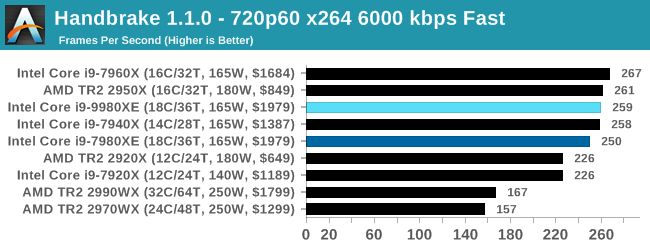
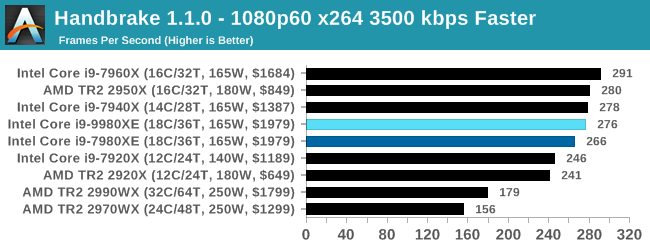
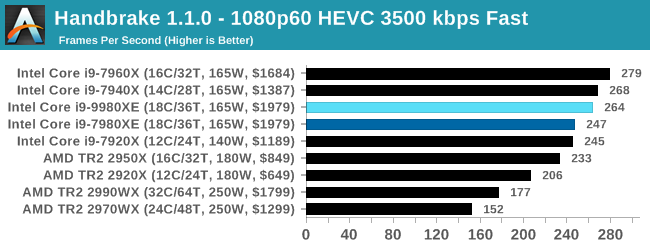
The 9980XE performs better than the 7980XE in our testing by a few percentage points, however these tests seem to benefit from fewer cores and a better turbo frequency profile.
7-zip v1805: Popular Open-Source Encoding Engine
Out of our compression/decompression tool tests, 7-zip is the most requested and comes with a built-in benchmark. For our test suite, we’ve pulled the latest version of the software and we run the benchmark from the command line, reporting the compression, decompression, and a combined score.
It is noted in this benchmark that the latest multi-die processors have very bi-modal performance between compression and decompression, performing well in one and badly in the other. There are also discussions around how the Windows Scheduler is implementing every thread. As we get more results, it will be interesting to see how this plays out.
Please note, if you plan to share out the Compression graph, please include the Decompression one. Otherwise you’re only presenting half a picture.
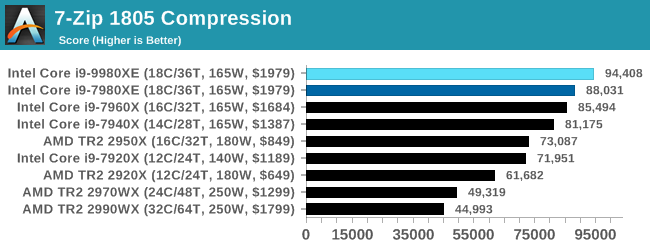
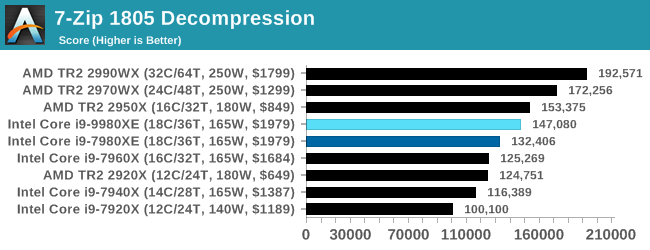
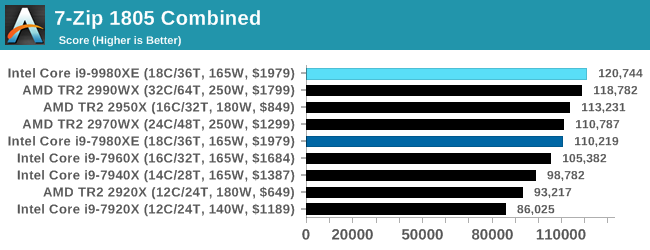
The increase in performance in both compression and decompression over the 7980XE pushes the 9980XE to the top of the overall standings.
WinRAR 5.60b3: Archiving Tool
My compression tool of choice is often WinRAR, having been one of the first tools a number of my generation used over two decades ago. The interface has not changed much, although the integration with Windows right click commands is always a plus. It has no in-built test, so we run a compression over a set directory containing over thirty 60-second video files and 2000 small web-based files at a normal compression rate.
WinRAR is variable threaded but also susceptible to caching, so in our test we run it 10 times and take the average of the last five, leaving the test purely for raw CPU compute performance.
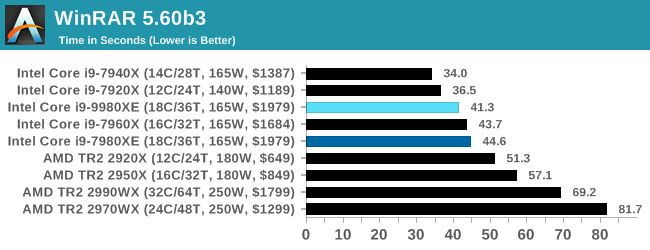
With WinRAR being a variable threaded and memory sensitive tool, while the 9980XE performs better than the 7980XE, having fewer Intel cores seems to work best.
AES Encryption: File Security
A number of platforms, particularly mobile devices, are now offering encryption by default with file systems in order to protect the contents. Windows based devices have these options as well, often applied by BitLocker or third-party software. In our AES encryption test, we used the discontinued TrueCrypt for its built-in benchmark, which tests several encryption algorithms directly in memory.
The data we take for this test is the combined AES encrypt/decrypt performance, measured in gigabytes per second. The software does use AES commands for processors that offer hardware selection, however not AVX-512.
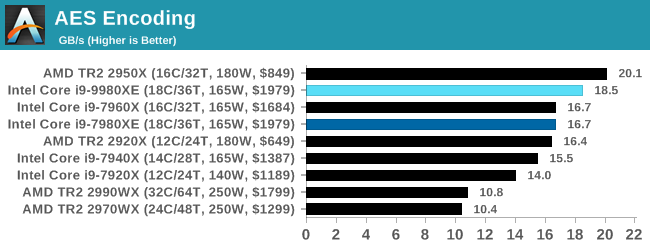
AES encoding seems to prefer AMD's situation, although the way the >16 core TR2 parts are configured is more of a hindrance. As expected, the i9-9980XE is the best Intel performer here.










143 Comments
View All Comments
imaheadcase - Tuesday, November 13, 2018 - link
Yah because you don't do anything intensive with the jobs you have, of course you would use laptops or whatever mobile. But the reality is most people would use desktops because simply faster to get stuff done, and more powerful.BYOD fyi is not like that for most companies..
imaheadcase - Tuesday, November 13, 2018 - link
..and if you are doing anything intensive with laptops..that just means company you work for is behind the curve and just being cheap and not fork out money for the right hardware.PeachNCream - Tuesday, November 13, 2018 - link
There are over 250K people on the payroll. There ARE desktop PCs around, but they are few and far between. I'm not going to get into an extended debate about this because it won't change anyone's perspective, but I do believe you've got a slight misconception about the usefulness and flexibility of portable computer hardware. A simple look at the availability of desktops versus laptops should be enough to make it obvious, for most people, computer == laptop these days.Spunjji - Tuesday, November 13, 2018 - link
You're eliding the difference between "convenient and sufficient" and "as powerful as anyone needs".I'll absolutely grant that if you're only going to have one system for doing your work and you move around a fair bit, then it absolutely makes sense to have that system be mobile, even if you lose a bit of edge-case performance.
For people doing /serious/ GPU grunt work something like an XPS 15 is going to provide between 1/2 and 1/3 of the power they could get with a similarly priced desktop. That compromise doesn't make any sense for someone whose job does not require mobility.
So sure, notebooks are better than ever for a large number of people. Doesn't make desktops and HEDT chips functionally irrelevant for businesses, though. If you can really use 18 cores for the work you're doing then being provided with an XPS 15 will be, at best, a sad joke.
Ratman6161 - Tuesday, November 13, 2018 - link
Any laptop is essentially on a different planet than any of the processors covered in this review (doesn't matter if we are talking Intel or AMD).1. If it is possible to do your work on a laptop (which I am myself at this very moment) then you (and me) are not the target audience for these CPU's. In fact, I'm not entirely sure why you even bother to read or comment on the story?
2. If you have to ask if you need it, you don't need it.
3. If you have to think more than about 1 second to make a decision between one of these and a laptop, then you don't need it.
4. If you do need one, then you already know that.
Most people don't need one, including me. I read these things because the technology is interesting and because I find it interesting what others might be doing. I don't really feel any need to insist that others need what I need and could not possibly need anything else.
PeachNCream - Wednesday, November 14, 2018 - link
So a differing opinion than yours should mean that someone not read an article or comment on it. That appears to be nothing more than a self-protective mechanism intended to erect a bubble in which exists nothing more than an echo chamber filled with your own beliefs. That's hardly a way to integrate new thinking, but I do understand that a lot of people fear change in the same way you do.Kilnk - Tuesday, November 13, 2018 - link
"But the reality is most people would use desktops because simply faster to get stuff done, and more powerful."See, that's the problem with your reasoning. You assume that most people need power when they do not. The reality is that the majority of people who need to use computers for work do not need to do rendering or any kind of intensive task. So no, most people don't use desktops nor would they want to use desktops given the opportunity. They use laptops.
FunBunny2 - Tuesday, November 13, 2018 - link
"Now we live in a BYOD (bring your own device) world where the company will pay up to a certain amount (varies between $1,100 and $1,400 depending on funding from upper echelons of the corporation) and employees are free to purchase the computer hardware they want for their work. There are no desktop PCs currently and in the past four years, only one person purchased a desktop in the form of a NUC. "The Man's advantage to the Worker Bees using laptops: their always 'on the job'. no time off. as close to slavery as it's legal to be. some smart folks are truly stupid.
PeachNCream - Tuesday, November 13, 2018 - link
"The Man's advantage to the Worker Bees.." (just quoting because of the lack of continuing indents in Anandtech's 1990's-era comment system)I think that's a bit of a stretch in our case. My division doesn't do on-call and we strictly prohibit our lower tier managers from tapping employees outside of their normal work hours. Even checking company e-mail outside of work hours is against posted (and enforced) policy. If we must, due to emergencies, they absolutely have to be compensated for the time regardless of whether or not they are hourly or salaried workers. I haven't seen an "emergency" that couldn't wait until the next day so that policy has not been put into use in at least the last five years. Computational mobility is no excuse to allow invasions into off-the-clock time and I for one won't allow it.
jjjag - Tuesday, November 13, 2018 - link
I hate to admit it but PNC is right. Super-high-powered desktops are an anachronism. If you need REAL horsepower, you build a server/compute farm and connect to it with thin-client laptops. If you are just doing software development, the laptop cpu is usually good enough.This is especially true of single socket monsters like these HEDT chips. The only reason they exist is because gamers will pay too much for everything. It's nothing more than an expensive hobby, and like all hobbies at the top end is all "want" and very little "need". The "need" stops somewhere around 6 or 8 cores.
It's exactly the same as owning a Ferrari and never taking it to the track. You will never use more than 20% of the full capabilities of it. All you really need is a Vette.